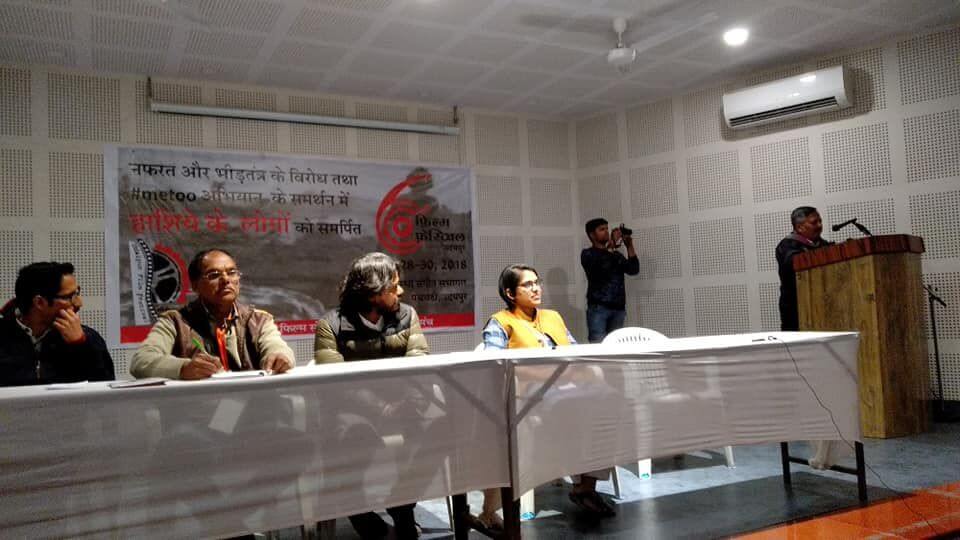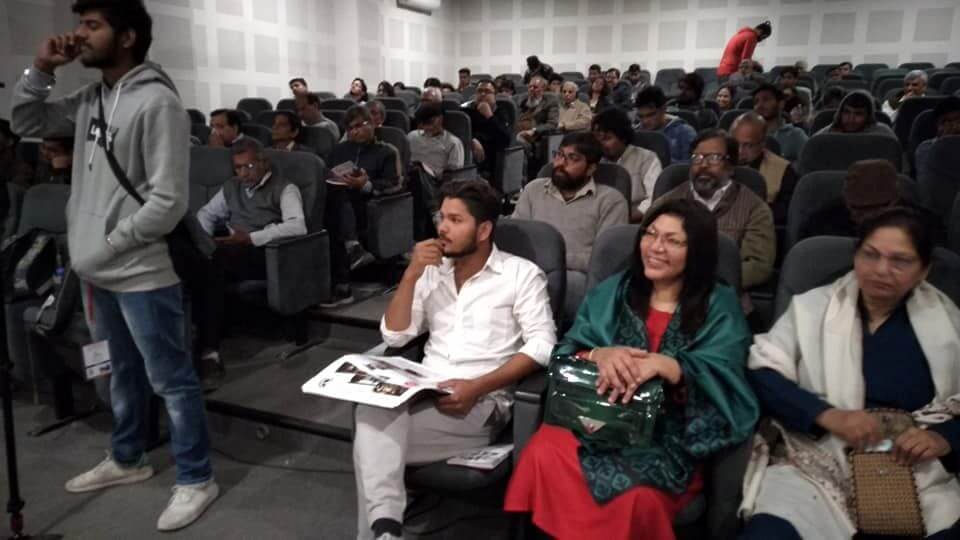Dedicated to the Marginalized: 6th Udaipur Film Festival

CINEMA of Resistance, organized at various places in the country, held the 6th Udaipur Film Festival at the Maharana Kumbha Music Auditorium on 28-30 December 2018. Inaugurating the festival, young filmmaker Pavan Shrivastava (whose film ‘Life of an Outcast’ was the first to be screened at the festival)acknowledged the power of cinema as a medium and said that unfortunately today a few people have a monopoly on this medium. Cinema needs to be freed on a large scale in order for it to be a medium through which the common people’s understanding can be developed. He further said that today the market decides issues like: what should we eat? What should we wear? And even what dreams should we have? Methods to make and screen media like cinema through people’s cooperation need to be developed to get freedom from this rule by the market.
Cinema of Resistance National Convener Sanjay Joshi stressed the need to take good cinema to every home. He said that today’s youth is not just a spectator but a participant in this phase of social media expansion and technological facility. He pointed out that while the mainstream media remains silent on hate killings and mob lynching, it is the new documentary filmmakers who tell these stories fearlessly.
Udaipur Film Society convener Rinku Parihar gave a brief outline of the 6-year journey of the Society and said that it runs solely on contributions and rejects all sponsorships. The session was conducted by Shailendra Pratap Singh Bhati.
The second film to be screened was based on the life of Uttarakhand folk singer Kabootari Devi, who was famous 50 years ago but sank slowly into oblivion afterwards. Recently, cultural activists have taken initiatives to focus on this forgotten heritage. Director Sanjay Mattoo shared anecdotes related to the making of the film.
The second documentary of the first day was Fatima Nizaruddin’s ‘Parmanu Urja Bahut Thagni Hum Jani’ , a satire on the present atomic energy projects in the country. The film generated a spirited and critical discussion on the use of atomic energy and the concept of ‘nation’ and ‘security’. The final film of the first day was Tapan Sinha’s classic ‘Ek Daktar ki Mauth’.

The second day started with the screening of young filmmakers Ashfaq, Furqan, and Vishu’s ‘Lynch Nation’. The film documents the experiences of people affected by violence in the name of religion and caste. A meaningful discussion followed, and many viewers thanked the filmmakers for giving them a clearer understanding and helping to remove prejudices. The filmmakers said that in order to bring out the truth, we must make our own media.
The second film was self-taught filmmaker Mohammed Ghani’s ‘Gubbarey’, which captures the quality of humanity beautifully in a short 9-minute story about a little girl who sells balloons. The third film was Dhilpi Gulati and Jainendra Dost’s documentary ‘Nach Bhikhari Nach Thi’. The fourth film was the famous Manjira Dutta 1987 documentary ‘Babulal Bhuiyan ki Qurbani’.
An important presentation of the day was an audio-visual presentation by Western Uttar Pradesh ‘Chalchitra Abhiyan’ activists Mohammed Shaqib Rangrez and Vishal Kumar. The final film of the second day was Saeed Mirza directed feature film ‘Salim Langde pe Mat Ro’.
On the third day, documentary filmmaker from Punjab Randip Muddoke’s “Landless’ was premiered. The film tells the story of the woes of Punjab’s landless dalit agrarian workers and their initiatives to organize themselves. The film’s balanced presentation was praised by all in the hall, spectators and other filmmakers alike.
Earlier, children among the spectators were regaled by the screening of the Spanish film ‘Ferdinand’, about a Spanish bull who tries to avoid becoming big and strong in order to escape the cruel bull-fighting arena. This film was followed by the children making paintings and posters which were exhibited.
In the second session, Ramashankar Vidrohi’s anthology ‘Nayi Kheti’(Navarun Publications) was released by Prof Sudha Chaudhary, Aslam, Manik, Himmat Seth, and Lingam Chiranjeev Rao. This was followed by the documentary ‘Main Tumhara Kavi Hun’ based on the life of poet Vidrohi, after which Director Nitin Pamnani and literary researcher Himanshu Pandya answered queries by the audience.
The last film in the festival was famous Director (from Kerala) John Abraham’s film ‘Amma Ariyan’, considered a milestone in the field of film society formation and film production through such societies in India.
In the closing session, Joint Convener of the film festival SN Jigyasu thanked the spectators, filmmakers, and students who had come from various educational institutions in Rajasthan. The festival concluded with paying homage to the distinguished Director Mrinal Sen.
Charu Bhawan, U-90, Shakarpur, Delhi 110092
Phone: +91-11-42785864 | +91 9717274961 E-mail: info@cpiml.org

